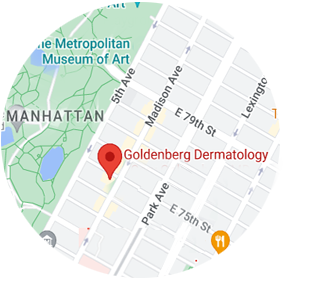Does Telogen Effluvium Cause Androgenic Alopecia?
Does Telogen Effluvium Cause Androgenic Alopecia?
At Manhattan’s Goldenberg Dermatology, the patients we treat for Chronic Telogen Effluvium (CTE) frequently ask us if their condition can develop into a more serious form of hair loss known as Androgenetic Alopecia (AGA). The short answer is that while CTE hair loss does not cause AGA, if an individual is already predisposed to Androgenetic Alopecia, Chronic Telogen Effluvium can potentially speed up the condition’s onset.
In this article, Manhattan board-certified dermatologist Gary Goldenberg discusses the relationship between Chronic Telogen Effluvium and Androgenetic Alopecia, and explains how CTE can accelerate hair loss from AGA.
What Is Telogen Effluvium Hair Loss?
Chronic telogen effluvium (CTE) is a hair loss condition usually experienced by individuals age 35 – 70, with the vast majority of CTE patients being women. The extent of the hair loss caused by CTE can range from barely noticeable in some patients to quite significant in others.
Hormone changes such as pregnancy, have been demonstrated to trigger CTE. But in most cases, the hair loss condition occurs without a clearly identifiable cause. In addition to hair loss, CTE patients may experience symptoms such as itching, burning, tingling sensations, and soreness that occurs when the hair is moved.
What is Androgenic Alopecia Hair Loss?
Androgenic alopecia (AGA), despite it’s misleading name, AGA can affect both men and women – and Manhattan individuals of every gender visit Goldenberg Dermatology to treat this condition.
The hallmark of AGA is a receding hairline, with incremental hair loss also typically occurring from the front of the scalp to the hair crown. AGA can develop in men as early as the teen years to early 20s, while female patients typically do not experience significant AGA-related hair loss until at least the age of 40.
Relationship of Chronic Telogen Effluvium & Androgenetic Alopecia Hair Loss
Thanks to a clinical study conducted by professor Rodney Sinclair, the question of whether CTE leads to AGA hair loss received much clearer answers. The study centered around five women, all of whom suffered from CTE hair loss. Sinclair observed changes in their condition through photos taken over the course of at least 7 years.
Over the years, 80% of subjects experienced hair loss of fluctuating severity, but the photos did not demonstrate any significant loss to hair density. This was then confirmed through the use of a serial scalp biopsy specimen, which did not show any “miniaturization” or shrinking of the hair follicles. Furthermore, out of all the women surveyed, only 1 of them received an AGA diagnosis.
When coupled with the fact that 40% of all women will experience AGA-related hair loss in their lifetime, the findings of the Sinclair Study more or less confirm that CTE does not cause AGA.
That being said, studies have shown that for patients with the right genetic makeup, a CTE diagnosis could potentially speed up AGA’s arrival. For example, while a patient might have normally developed AGA at the age of 49, with CTE, that same patient would instead experience hair loss from AGA at the age of 47. Nonetheless, we remind the hair loss patients at our Manhattan practice that CTE does not cause AGA, and the aforementioned individual would have eventually developed AGA either way.
Hair Loss Treatment for CTE and AGA – Manhattan
Whether you suffer from hair loss due to Telogen Effluvium or Androgenetic Alopecia, Dr. Goldenberg offers the latest and most advanced treatments for hair loss in his Manhattan office.
Both PRP and stem cell hair restoration – available at Goldenberg Dermatology in Manhattan – are completely natural methods of stimulating hair growth in patients with either CTE, AGA or a combination of both. Both Platelet Rich Plasma (PRP) and Stem Cells, when injected into the scalp, can stimulate the dormant hair follicles to start producing hair again.
Whether you are suffering from TE, Androgenetic Alopecia, or another cause of hair loss. Call today for the latest, most advanced and effective hair loss treatments in the greater Manhattan area.











